 |  |  |
| Romanian Army in the Second World War · Forum Guidelines |
 Help Help
 Search Search
 Members Members
 Calendar Calendar
|
| Welcome Guest ( Log In | Register ) | Resend Validation Email |
| Pages: (8) « First ... 3 4 [5] 6 7 ... Last » ( Go to first unread post ) |    |
| woj |
Posted: December 02, 2004 09:20 pm
|
||
|
Sergent Group: Members Posts: 173 Member No.: 240 Joined: March 11, 2004 |
Oh - I usually know the general subject - and I can understand the main idea of the text. And - with no doubts - names, dates, numbers, etc. |
||
| Florin |
Posted: December 03, 2004 02:36 am
|
||
|
General de corp de armata Group: Members Posts: 1879 Member No.: 17 Joined: June 22, 2003 |
Some descendants of the Polish refugees of 1939 are still living in Romania. Or so it was, in the early 1990's, when I lived there. They have at least one association and they keep in touch with Poland, including through the Catholic Church. Did you ever tried to ask for their help to translate your documents? |
||
| Dénes |
Posted: December 03, 2004 03:34 am
|
||
|
Admin Group: Admin Posts: 4368 Member No.: 4 Joined: June 17, 2003 |
That's totally inaccurate. However, it's way off from the topic, so I won't detail it. Col. Dénes |
||
| Florin |
Posted: December 03, 2004 05:37 am
|
||||||
|
General de corp de armata Group: Members Posts: 1879 Member No.: 17 Joined: June 22, 2003 |
Colonel Denes, I agree that this matter slid away from the topic, but Woj made links with few interesting maps, and I have to say something about them.
Woj, Whatever history I know, it is not due to my history teachers. This should sound good for them when I am making mistakes, and bad for them when I am writing something right. Thank you for the links. I downloaded the maps. This reminded me that on Internet we can find almost everything. But do the maps really contradict me? It is true that the Hungarian nation and the Polish nation were neighbours all these years. But unfortunately official borders are between states (city-states, kingdoms, empires, republics), and not between nations. So, what do we have on the map about 1547? Poland, and independent state, has border with "Austrian Hungary". Id est the Austrian Empire. On the map of 1660, we see again Hungary, but not as a separate entity. It is shown very clearly divided between the Turks and the Austrians. So what actually Poland had as neighbour was the Austrian Empire. Then, on the map of 1700 it can be read "of Hungary". Whatever it is in front of these 2 words, it cannot be "Kingdom", because a "Kingdom of Hungary" did not exist in 1700. Later, when in 1867 Hungary became a kingdom at last, it was the turn for Poland to doesn't exist as state. This is true even for 1848, in the short period when Hungary may be considered an independent state. So, in 1918, when for the first time since 1526 the Hungarian nation and the Polish nation had both their own independent state, Czechoslovakia was in between. Again, official borders are considered between states (city-states, kingdoms, empires, republics), and not between nations. Considering this, my statement still stands. This post has been edited by Florin on December 03, 2004 06:02 am |
||||||
| Victor |
Posted: December 03, 2004 07:03 am
|
|
Admin Group: Admin Posts: 4350 Member No.: 3 Joined: February 11, 2003 |
Try contacting the military attache in Warsaw for details on how to obtain acces to the Pitesti archives.
You can also write an email to aosca@mapn.ro (col. Osca is teh chief of the archives IIRC). |
| woj |
Posted: December 03, 2004 11:29 am
|
||
|
Sergent Group: Members Posts: 173 Member No.: 240 Joined: March 11, 2004 |
I know about Polish minority in Romania. They are not only descendants of Polish refugees from 1939 (see for instance articles published in: "Mai aprope unii de Alţii. Relaţii polono-Române”, Suceava 2003). But - in my opinion - if I'll decide to research any subject concerning Romanian history (like mentioned above) I must speak Romanian. Or - at least - I must understand Romanian texts. No other way. It might be problem for me, because - as you see - I haven't talent for languages. |
||
| Stellan |
Posted: December 03, 2004 01:25 pm
|
||
|
Soldat Group: Members Posts: 46 Member No.: 369 Joined: October 12, 2004 |
I am writing only from memory: Polish submarines "Sep", "Zbik" and "Rys" were interned in Vaxholm and later moved to Strängnäs, lake Mälaren (where several Polish sailors met local girls, married and stayed in Sweden. "Sep" arrived 16th Sept 1939. "Zbik" and "Rys" 17th Sept 1939. Back to Poland 25th Oct 1945. Patrol craft "Batory" arrived 2nd (?) Sept 1939 at Klintehamn, Island of Gotland". To Poland 25th Oct 1945. If I rember right also sail-training ship "Dar Pomorza" arrived in Sweden in Sept 1939 and was used as barracks-ship for the Polish sailors until returned 25th Oct 1945. Never heard of Polish aircrafts coming to Sweden. Enclosed "Batory" arriving in Sweden. (Source newspaper Gotlands Allehanda) Have a nice weekend! Stellan Attached Image 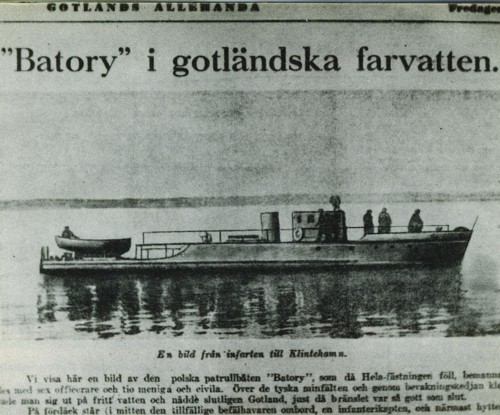 |
||
| woj |
Posted: December 03, 2004 05:57 pm
|
||
|
Sergent Group: Members Posts: 173 Member No.: 240 Joined: March 11, 2004 |
See this address, please: http://rwd-dwl.net/eksport/eewakuacja.htm Szwecja=Sweden: RWD-13 SP-BML SE-AOF Estonia: RWD-13S SP-BMW Latvia: RWD-17 (x2) - evacuation to Daugavpils (Dyneburg) This post has been edited by woj on December 03, 2004 06:00 pm |
||
| Florin |
Posted: December 03, 2004 08:10 pm
|
||
|
General de corp de armata Group: Members Posts: 1879 Member No.: 17 Joined: June 22, 2003 |
You shouldn't blaim yourself. Romanian is a very difficult language, because it has countless exceptions from rules. I am wondering if it is any other Indo-European language with so many exceptions from the general self-imposed grammar rules. The accent can fall anywhere: on first, 2nd, 3rd or 4th syllable. The same adjective may stay in front, but also in the rear of a noun. The verbs have a lot of different ways to adjust for time and person. There are tens of words which seem to sound as the feminine version of the masculine format of a noun, but actually their meaning is completely different: mos - moasa, cocos - cocoasa, vin - vina, cal - cala, mir - mira etc. And so on... Fortunately for other countries, usually Romanian born immigrants do the job of translators. |
||
| woj |
Posted: December 03, 2004 09:00 pm
|
||
|
Sergent Group: Members Posts: 173 Member No.: 240 Joined: March 11, 2004 |
Good news. I don't hope speak Romanian fluently. I need just basic knowledge - and understanding of written texts. |
||
| Florin |
Posted: December 04, 2004 02:14 am
|
|
General de corp de armata Group: Members Posts: 1879 Member No.: 17 Joined: June 22, 2003 |
I cannot identify the Polish planes following the nicknames shown in the list offered here by Woj, so I shall show their industrial / production name, and then we will see how many are on his list of airplanes obtained by Romania.
PZL P. 7 (fighter) From "The Illustrated Encyclopedia of Military Aircraft ", by Enzo Angelucci This post has been edited by Florin on December 04, 2004 02:17 am Attached Image 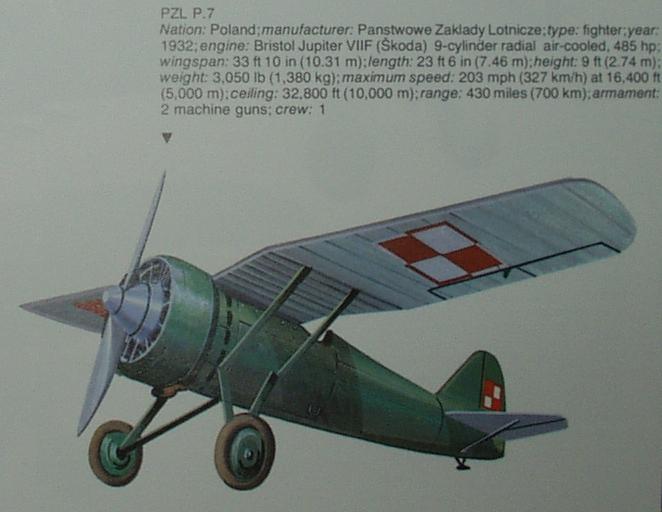 |
| Florin |
Posted: December 04, 2004 02:19 am
|
|
General de corp de armata Group: Members Posts: 1879 Member No.: 17 Joined: June 22, 2003 |
Comparison between the size of the Polish fighter PZL P. 24 and the size of the Romanian fighter I.A.R. 80, and also the size of some famous Russian, Italian and Japanese fighters
From "The Illustrated Encyclopedia of Military Aircraft ", by Enzo Angelucci This post has been edited by Florin on December 04, 2004 02:35 am Attached Image 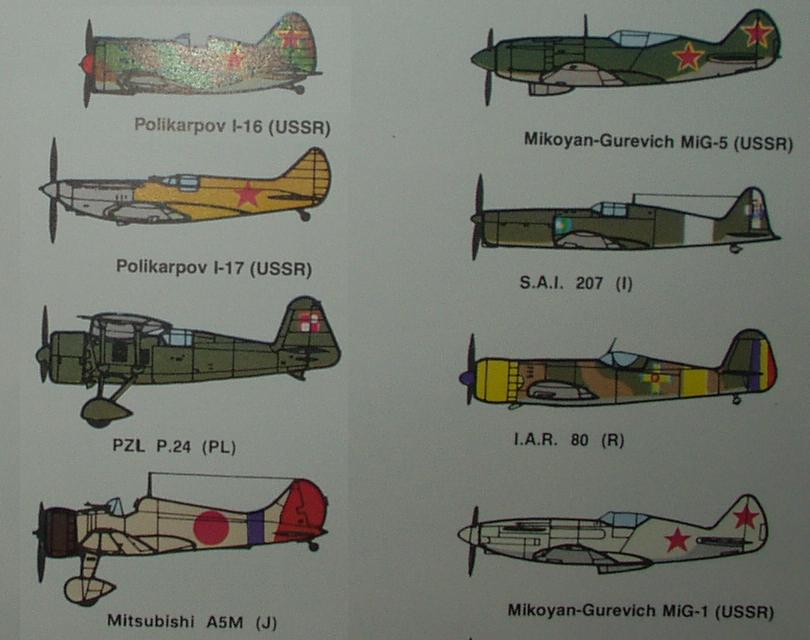 |
| Florin |
Posted: December 04, 2004 02:26 am
|
|
General de corp de armata Group: Members Posts: 1879 Member No.: 17 Joined: June 22, 2003 |
PZL P. 23B (dive bomber)
From "The Illustrated Encyclopedia of Military Aircraft ", by Enzo Angelucci This post has been edited by Florin on December 04, 2004 02:30 am Attached Image  |
| Florin |
Posted: December 04, 2004 02:40 am
|
|
General de corp de armata Group: Members Posts: 1879 Member No.: 17 Joined: June 22, 2003 |
PZL P. 24 (fighter) From "The Illustrated Encyclopedia of Military Aircraft ", by Enzo Angelucci Attached Image 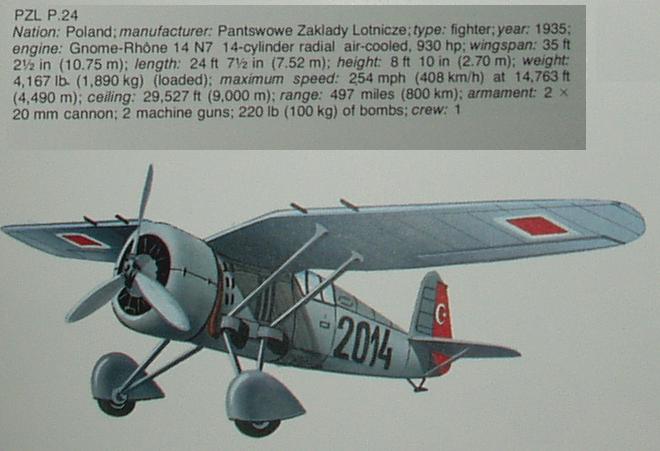 |
| Florin |
Posted: December 04, 2004 02:44 am
|
|
General de corp de armata Group: Members Posts: 1879 Member No.: 17 Joined: June 22, 2003 |
Comparison between the size of the Polish twin engine bomber PZL P. 37 and the size of other twin engine bombers
From "The Illustrated Encyclopedia of Military Aircraft ", by Enzo Angelucci This post has been edited by Florin on December 04, 2004 02:58 am Attached Image 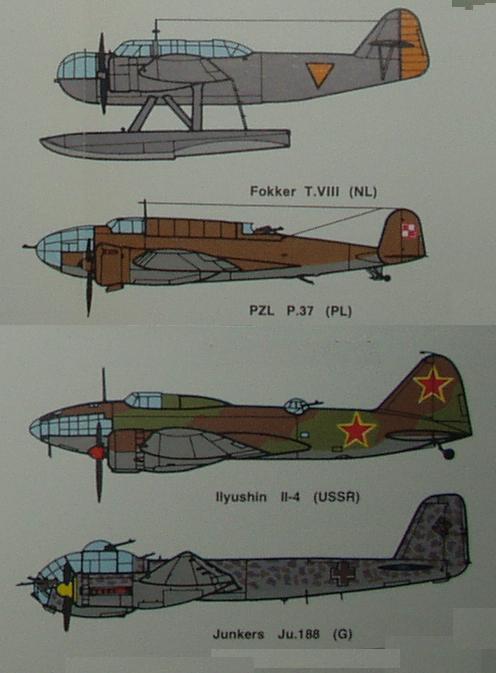 |
0 User(s) are reading this topic (0 Guests and 0 Anonymous Users)
0 Members:
 Pages: (8) « First ... 3 4 [5] 6 7 ... Last »
Pages: (8) « First ... 3 4 [5] 6 7 ... Last » |
   |
[ Script Execution time: 0.0171 ] [ 14 queries used ] [ GZIP Enabled ]
Powered by Invision Power Board(U) v1.3.1 Final © 2003 IPS, Inc.





